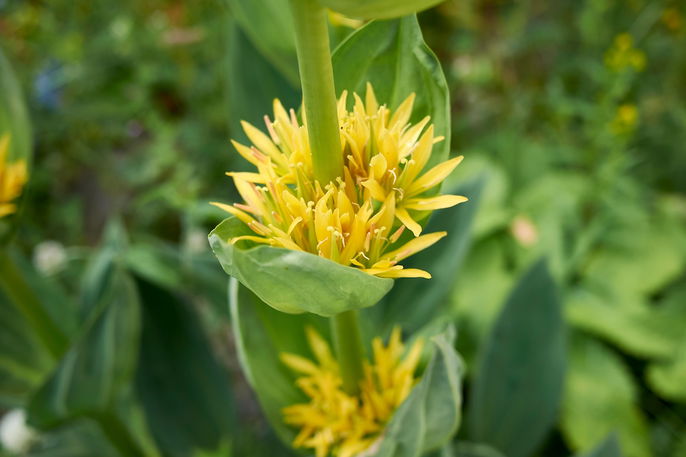Gentian is a medicinal plant of the Gentiana lutea species. It contains antiemetic, anti-inflammatory and digestive properties, and can therefore be used to help treat gastrointestinal problems, like indigestion, heartburn, gastritis, nausea or vomiting.
The parts of gentian that are normally used are its roots, which is where active substances like gentisin, alkaloids, tannins and essential oils, are extracted to prepare tea or tinctures.
Gentian can be found in health food stores or compounding pharmacies, and should be used as indicated by a doctor or medicinal plant specialist.

What it's used for
Gentian can be used to treat or relieve:
- Excess intestinal gas
- Abdominal colic
- Indigestion
- Nausea and vomiting
- Diarrhea or food poisoning
- Heartburn or gastritis
- Intestinal worms
- Anemia
Genitan also contains amarogentin and gentisin, which give this plant its bitter taste. These can stimulate the taste buds and increase your appetite.
The heatlh benefits of gentian are made possible by the the substances that are naturally found in its composition, like gentianine, gentialutin, gentiopicrin, gentiamarin, pectin, tannins, glycosides, essential oils and gentianic acid. These substances provide the plant with antiemetic, anti-inflammatory, digestive, laxative, tonic, antipyretic and antacid properties.
Although it contains many health benefits, gentian consumption should not replace the medical treatment prescribed by your doctor. It should be used as indicated by a doctor or medicinal plant specialist.
How to use
The roots are the part of the gentian plant that are most commonly used.
1. Gentian tea
Gentian tea should be taken before meals.
Ingredients
- 1 teaspoon of dried and chopped gentian root
- 1 cup of water
Directions
Bring the water to a boil, then remove from heat and add the gentian root. Cover and allow to infuse for 5 to 10 minutes. Then strain, wait for it to cool, and drink 1 cup of this tea, two to three times per day.
2. Gentian tincture
Gentian tincture can be purchased at compounding pharmacies or natural health stores. The recommended dose for adults is 1 to 4 mL of the tincture diluted in water, up to 3 times a day.
The use of gentian tincture should be guided by a doctor or medicinal plant specialist.
Possible side effects
Consuming excessive amounts of gentian can lead to side effects like headaches, vomiting and gastrointestinal discomfort.
Contraindications for use
Gentian should not be used by children, pregnant women or breastfeeding women. It should be avoided by people with high blood pressure, or anyone with a history of stomach ulcers, intestinal ulcers or a predisposition to headaches.
Because it contains alcohol, the use of gentian tincture is contraindicated for people undergoing treatment for alcoholism and are taking disulfiram.





























